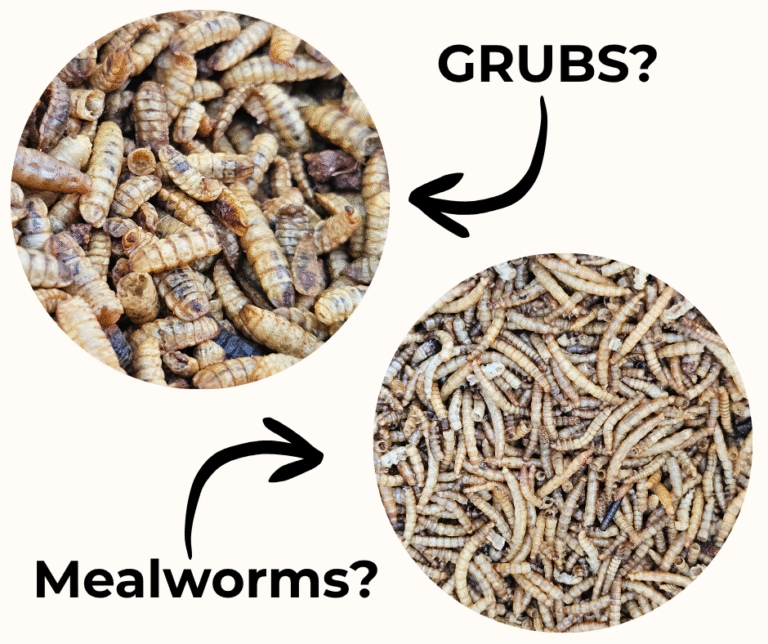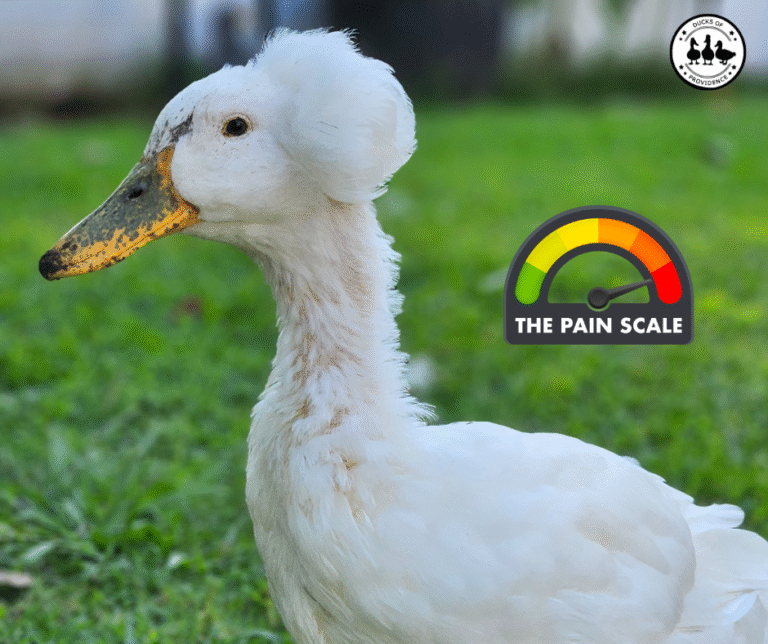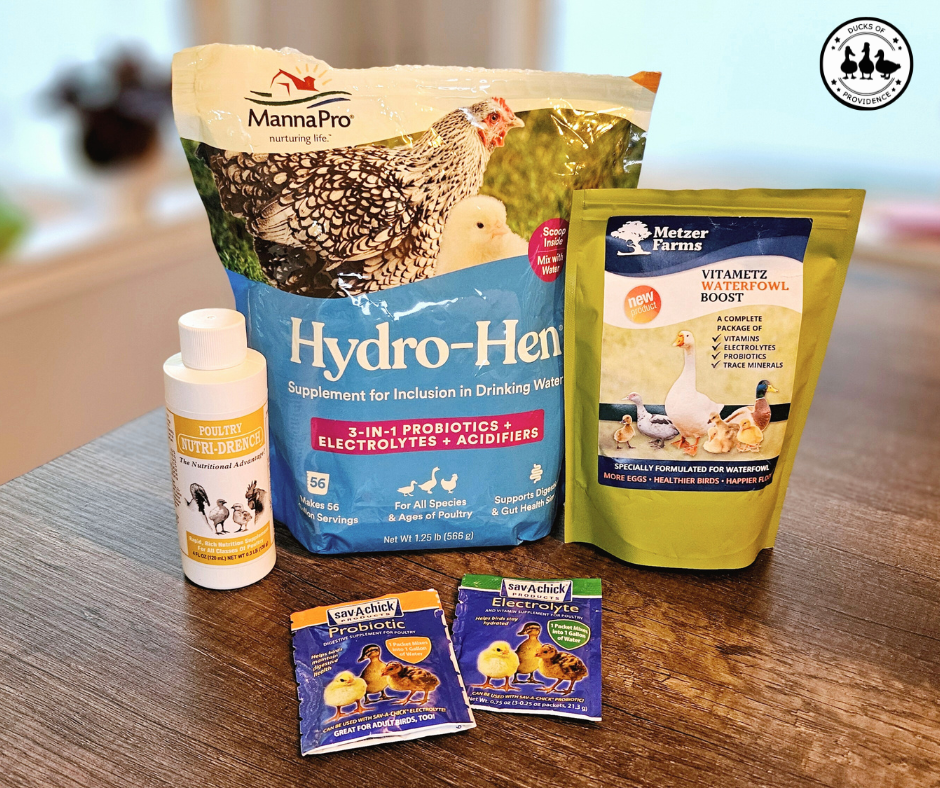
Supplements for Ducks: What Your Pet Ducks Really Need
Just like us, ducks thrive on a balanced, nutrient-rich diet—but sometimes, their daily feed doesn’t cover everything they need. While high-quality commercial duck or waterfowl feed is designed to meet most nutritional requirements, certain situations call for a little extra support. That’s where supplements come in.
From fast-growing ducklings who need extra niacin to prevent leg issues, to adult layers requiring more calcium and vitamin D3 to maintain strong eggshells, nutritional supplements can play an important role in keeping our feathered friends healthy. Even stress, illness, molting, or seasonal changes can increase the demand for specific nutrients.
As duck parents, it’s important to understand when supplements are necessary, which ones are safe, and how to use them properly. Over-supplementation can be just as harmful as a deficiency—so our approach, as always, should be guided by science, careful observation, and lots of love.
In this post, we’ll break down the most common supplements for pet ducks and ducklings, when to use them, and how to incorporate them into your flock’s care routine, based on both research and our own experience with our seven beloved ducks.
Ducks of Providence is free, thanks to reader support! Ads and affiliate links help us cover costs—if you shop through our links, we may earn a small commission at no extra cost to you. Thanks for helping keep our content free and our ducks happy! 🦆 Learn more
Understanding Duck Nutrition Basics
Before diving into supplements, it’s important to understand what ducks actually need—and what they already get from their regular feed.
High-quality commercial waterfowl or all-flock feeds are designed to meet most of the daily nutritional requirements for ducks. These feeds typically include protein, fat, fiber, essential vitamins (like A, D, E, K, and B-complex), and minerals (such as calcium, phosphorus, and selenium). However, not all feeds are the same, and ducks at different life stages have different needs.
For example:
- Ducklings grow rapidly and require high levels of protein and niacin (vitamin B3) to support healthy bone development.
- Laying hens need extra calcium and vitamin D3 to produce strong, healthy eggs.
- Molting or sick ducks may benefit from added protein, omega-3s, or vitamin supplements to recover and regrow feathers.
Even with a good base diet, gaps can still appear. Ducks kept indoors or in shaded runs may not get enough natural sunlight to produce vitamin D. Ducks that aren’t foraging much might lack access to minerals found in natural soil or greens. And let’s not forget: some ducks are picky eaters. We’ve definitely had our share of those!
That’s where supplements come in—not as a replacement for good nutrition, but as a tool to fill in the gaps when needed.
Science Note: Ducks, like other birds, have faster metabolisms and unique digestive systems compared to mammals. This means that even minor nutritional imbalances can affect them quickly—especially during growth, laying, or illness.
Want to go deeper? We take a much closer look at protein, calcium, niacin, and more in our comprehensive duck nutrition guide. If you’re wondering how to choose the right feed or what treats are best, that article is a great place to start.
In the next section, we’ll take a closer look at the most common deficiencies in ducks and the signs to watch for.
Common Nutritional Deficiencies in Ducks
Even with good-quality feed, ducks can develop nutritional deficiencies, especially during certain life stages or under stress. Recognizing the signs early and knowing which supplements to use can make a big difference in your duck’s long-term health.
Here are the most common nutrient deficiencies seen in pet ducks and ducklings:
| Nutrient | Who’s at Risk | Why It Matters | Symptoms | How to Supplement |
|---|---|---|---|---|
| Niacin (B3) | Ducklings (0–8 weeks) | Supports leg and joint development | Wobbly gait, bowed legs, swollen joints | Brewer’s yeast or niacin powder |
| Calcium | Laying hens | Essential for strong eggshells and muscle function | Soft-shelled eggs, lethargy, egg binding | Free-choice oyster shell, calcium with D3 (avian calcium) |
| Vitamin D3 | Indoor or shaded ducks; winter months | Needed for calcium absorption and bone strength | Poor shell quality, weakness | Sunlight or D3 supplement |
| Vitamin E & Selenium | Ducklings; stressed/sick adults | Supports muscle and nervous system health | Tremors, muscle weakness, wry neck | Vitamin E oil/seeds + controlled selenium |
| Trace Minerals | Ducks on unbalanced diets | Supports feathers, immunity, reproduction | Poor feathering, low energy, anemia | Mineral mix (caution with overdose) |
Niacin (Vitamin B3)
Who’s at risk?
Primarily ducklings—especially during the first 8 weeks of life. This is when their legs are growing rapidly, and their demand for niacin is at its peak. Ducklings raised on chick starter or feeds not formulated for waterfowl are especially vulnerable, as those feeds often contain too little niacin.
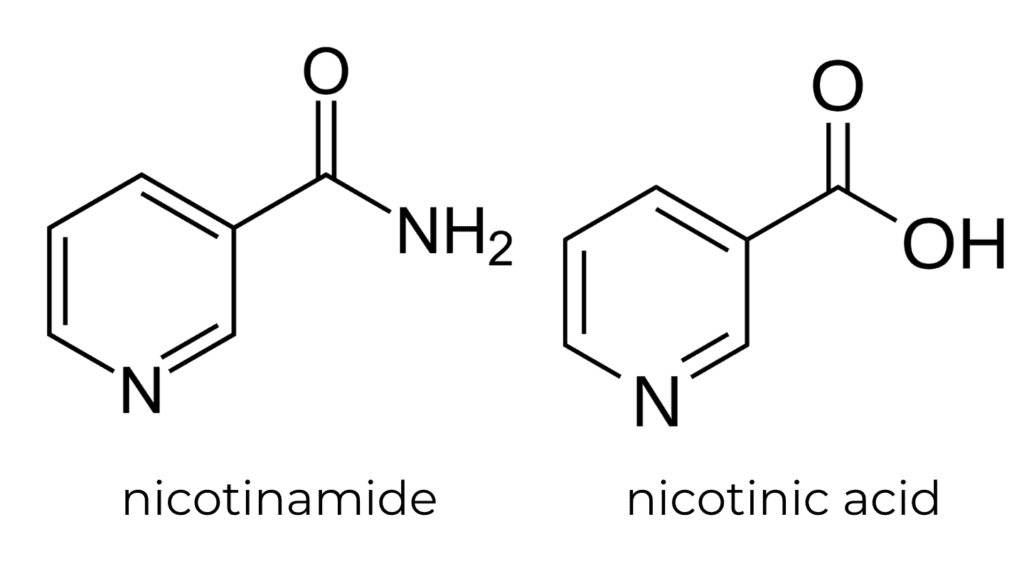
Why it matters:
Niacin plays a vital role in metabolism and the development of muscles, bones, and joints. Ducks don’t store niacin in their bodies the same way some other animals do, so they need a steady supply in their diet. A deficiency can cause improper leg development and lifelong mobility issues.
Symptoms to watch for:
- Wobbly or hesitant gait
- Swollen hocks or leg joints
- Splayed or bowed legs
- Reluctance to walk or stand
- Lying down excessively or “scooting” rather than walking
How to help:
- Brewer’s yeast is the easiest daily supplement—simply sprinkle it on feed (~1 tablespoon per cup of feed for ducklings).
- For more precise or therapeutic dosing, use a liquid B-complex supplement in their water or orally.
- Make sure the feed you’re using is either formulated for waterfowl or carefully supplemented.
From our flock: We give all ducklings added niacin right from day one. It’s an easy, safe way to prevent problems before they start.
Want to dive deeper? Check out our full guide on Niacin Deficiency and how to prevent it.
Calcium
Who’s at risk?
Primarily laying females, although any duck can suffer from calcium imbalance if the diet is poorly balanced. Ducks that lay year-round or start laying early are especially at risk.
Why it matters:
Calcium is essential not only for building eggshells, but also for proper muscle contractions (including those needed to lay eggs). When calcium is lacking, the body prioritizes the egg and starts pulling calcium from the duck’s bones, which can lead to painful or even fatal conditions like egg binding or fractures.
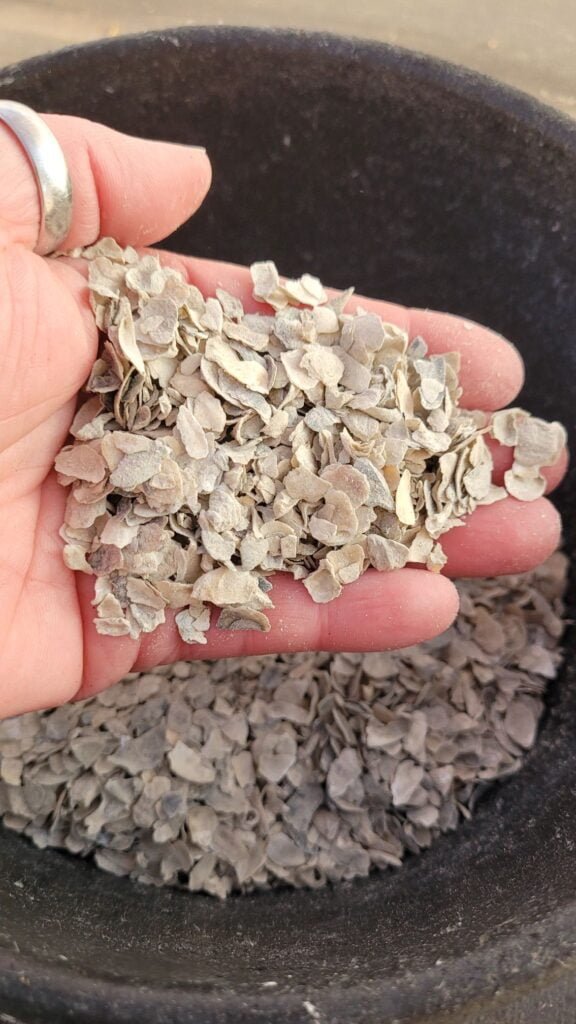
Symptoms to watch for:
- Soft-shelled or shell-less eggs
- Misshapen or brittle eggshells
- Lethargy or difficulty walking
- Straining or sitting in the nest box without laying
- Loss of appetite or weakness
How to help:
- Provide crushed oyster shells in a separate dish. Ducks will self-regulate their intake.
- Ensure your feed contains adequate calcium for layers—aim for 3–4% in layer formulas.
- Vitamin D3 must be available (through sunlight or supplements), or calcium can’t be properly absorbed.
Caution: Never give calcium supplements to ducklings—they need very little calcium, and excess can cause kidney damage.
Want to learn more? We cover this in detail in our post on Soft-Shelled Eggs and Calcium Deficiency, including what to do when things go wrong.
Vitamin D3
Who’s at risk?
Ducks without access to regular sunlight, such as those kept indoors, under full-shade covers, or during long winter months. Vitamin D3 is synthesized in the skin through UVB exposure, so lack of sun = lack of D3.
Why it matters:
Vitamin D3 is a crucial partner to calcium—it enables the body to absorb and use calcium properly. Without it, even a calcium-rich diet won’t protect against bone and shell issues. It also plays roles in immune function and egg production.
Symptoms to watch for:
- Weak, rubbery, or thin eggshells
- Poor leg strength or bone structure
- Muscle tremors or uncoordinated movement
- General weakness or fatigue
How to help:
- Encourage safe sun exposure for at least a few hours daily.
- Use a calcium + D3 supplement if sunlight is limited.
- Consider UVB bulbs if ducks are kept indoors or during flockdowns.
Tip: Many calcium supplements include D3—check the label to ensure proper pairing.
Vitamin E and Selenium
Who’s at risk?
Ducklings during their early weeks and adults under stress, illness, or with poor-quality feed. Also at risk: ducks recovering from infection or those on high-fat diets (vitamin E is fat-soluble).
Why it matters:
Vitamin E and selenium work as powerful antioxidants, protecting cells from oxidative damage. They also support nerve and muscle health. A deficiency can lead to serious neurological conditions, especially in ducklings, including “wry neck” and muscle degeneration.
Symptoms to watch for:
- Twisted neck or head drooping to one side (wry neck)
- Muscle tremors or uncoordinated movement
- General weakness or lack of balance
- Lethargy, especially in young ducklings
How to help:
- Supplement with vitamin E through softgel capsules, wheat germ oil, or sunflower seeds (used in moderation).
- Selenium should be added carefully—very small amounts are needed, and too much can be toxic.
- Many vitamin mixes (like Poultry Cell) already contain selenium in safe doses.
Vet Note: Always double-check dosages for selenium. It’s essential—but in the tiniest amounts.
Trace Minerals (Zinc, Iron, Copper, Manganese)
Who’s at risk?
Any duck on an imbalanced diet, especially flocks that rely heavily on scratch grains, homemade mixes, or low-quality feed without a guaranteed analysis.
Why it matters:
These minerals play vital roles in feather quality, immune function, enzyme production, blood formation, and reproductive health. Even small deficiencies can lead to chronic, low-level problems that affect overall well-being.
Symptoms to watch for:
- Dull, ragged, or slow-growing feathers
- Poor appetite or slow growth in ducklings
- Anemia (pale combs/feet, lethargy)
- Reduced egg production or fertility
How to help:
- Feed a complete, balanced commercial feed with trace minerals listed.
- Use mineral supplements like Rooster Booster or Hydro-Hen if you suspect a gap or during stress periods.
- Avoid feeding too many unfortified grains or treats that dilute the nutrient density of the diet.
Pro Tip: For more on fats, oils, and their roles in duck health, see our detailed post on Omega-3 and Omega-6 Fatty Acids for Ducks.
If your duck seems off but you’re not sure why, always start by reviewing their diet. A deficiency may be the root cause, and a simple supplement might bring quick improvement.
Types of Supplements for Ducks
From growing ducklings to hardworking layers and aging seniors, ducks can benefit from a variety of supplements when used appropriately. While a balanced commercial feed does the heavy lifting, these targeted additions can help support your ducks through growth, stress, illness, or environmental challenges.
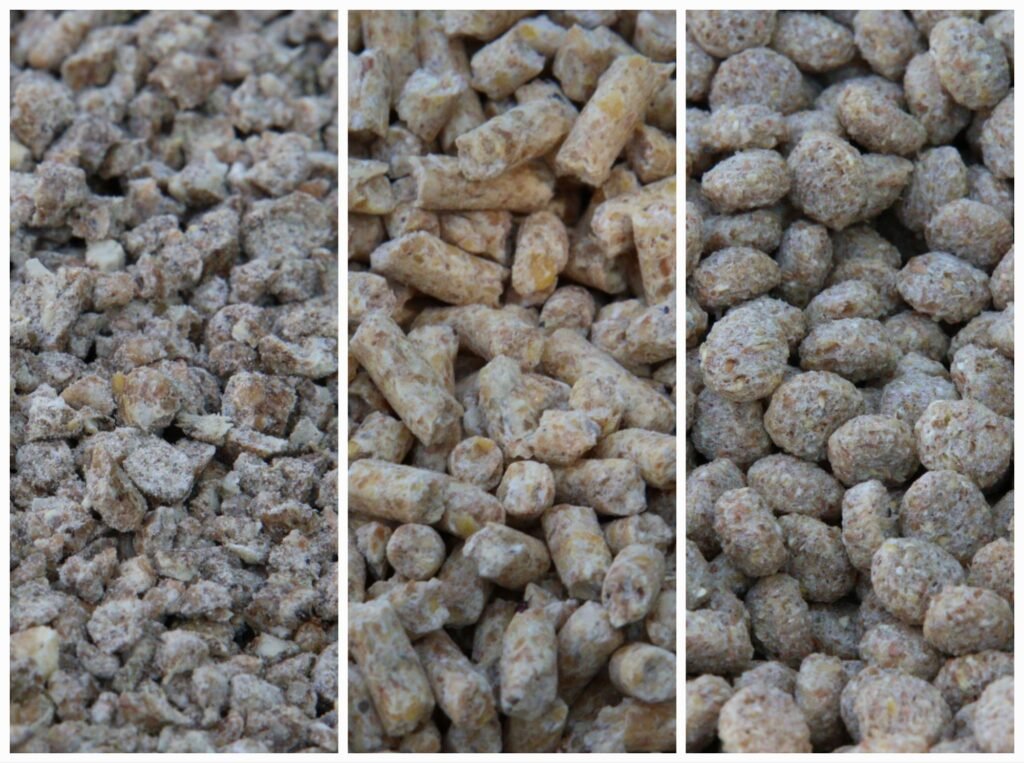
Below are the most common supplement categories, what they’re used for, and some trusted product types we’ve personally tried or would recommend.
Niacin (Vitamin B3)
Why it’s important:
Niacin is essential for ducklings, especially during their first 8 weeks of life. It supports healthy leg and joint development, and a deficiency can cause serious issues like bowed legs, splayed legs, or permanent deformities. Adult ducks under stress (molting, illness) may also benefit from a boost.
Supplement forms & examples:
- 🔗 Brewer’s Yeast Powder – Mix into feed daily (approx. 1 tablespoon per cup of feed for ducklings). Choose one with added garlic or other B-vitamins for bonus benefits.
- 🔗 Plain Niacin Powder (non-flush, non-time-release) – Can be added to water, but ensure proper dosage.
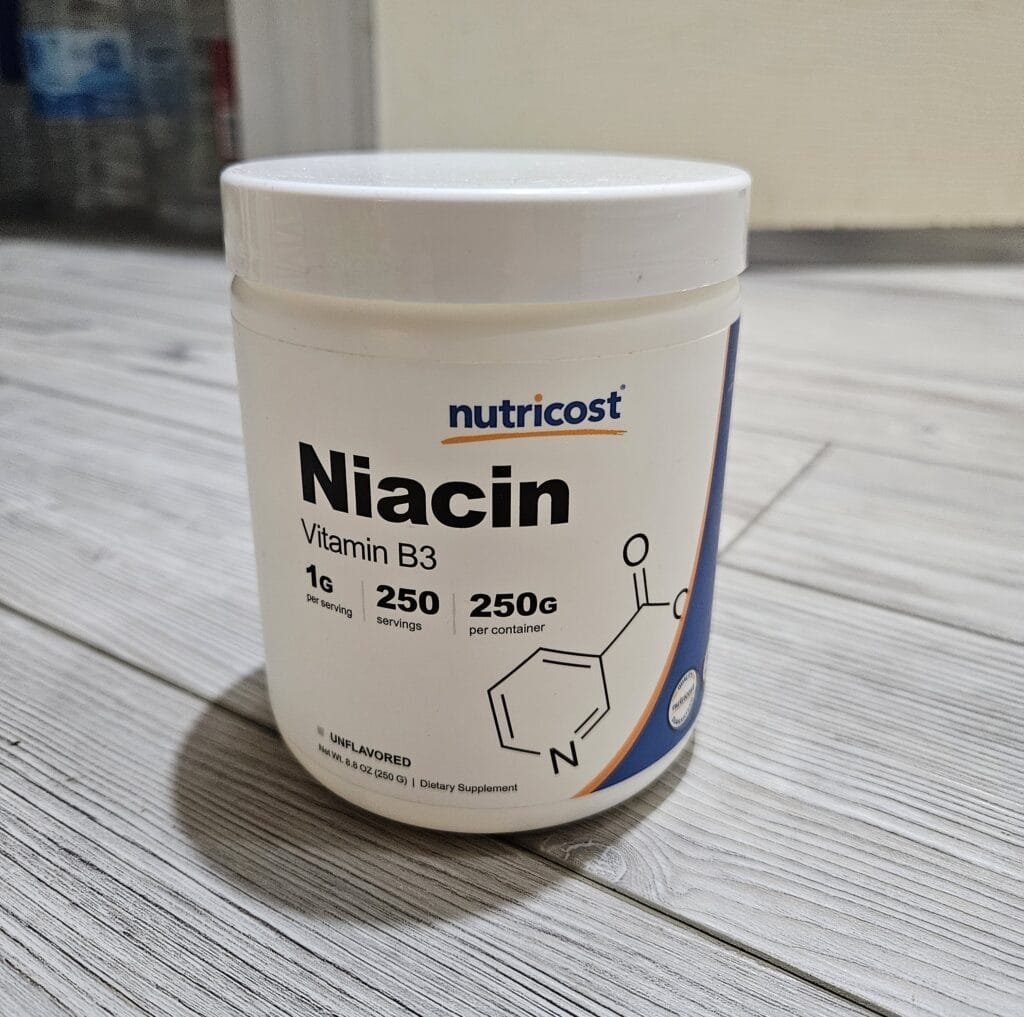
Tip from our flock: We’ve had great success using niacin dissolved in their drinking water during the first 6 to 8 weeks, followed by brewer’s yeast for maintenance. Easy, safe, and effective.
Calcium + Vitamin D3
Why it’s important:
Laying ducks have high calcium demands for producing strong, healthy eggshells. Without enough calcium, they may lay soft-shelled eggs, or worse, suffer from egg binding or calcium being leached from their bones. Vitamin D3 helps them absorb calcium properly, especially when they don’t get enough sunlight.
Supplement forms & examples:
- 🔗 Crushed Oyster Shells (Scratch & Peck) – Offered free-choice in a small dish (don’t mix into feed). Ducks will instinctively eat what they need.
- 🔗 Calcium + D3 Powder for Poultry (Avian Calcium) – A good option during peak laying season or after a laying-related issue. Can be sprinkled onto moist feed.
- Sterilized Eggshell Powder (homemade or store-bought) – An eco-friendly, DIY option if you already use a lot of eggs.
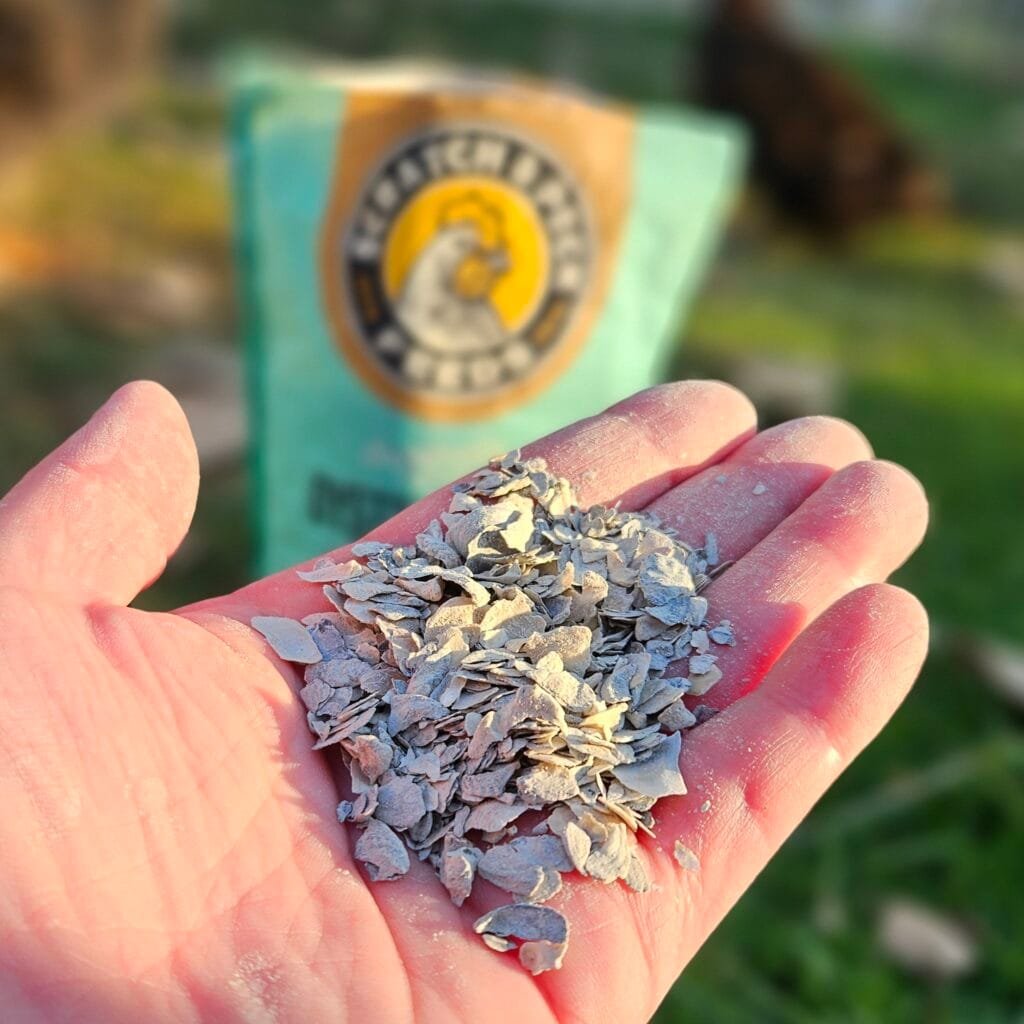
Important note: Ducklings should not be given calcium supplements—too much calcium early on can damage their kidneys. Drakes should also not get extra calcium supplements, as they also damage their kidneys.
Multivitamin & Mineral Mixes
Why it’s important:
These are all-purpose health boosters. Ducks recovering from illness, going through a heavy molt, or just needing a little extra support can benefit from a well-rounded vitamin mix. They typically contain B vitamins, iron, trace minerals, and antioxidants.
Supplement forms & examples:
- 🔗 Rooster Booster Poultry Cell – A thick liquid supplement rich in iron, B12, and other vitamins. Great for anemia, weakness, or recovery.
- 🔗 Nutri-Drench for Poultry – A fast-absorbing vitamin formula ideal for emergency support.
- 🔗 Vitametz – A well-balanced multivitamin powder specifically formulated for waterfowl that also includes electrolytes and probiotics. A true all-in-one supplement for both ducklings and adult ducks.
- 🔗 Save-a-Chick Vitamin & Electrolyte Packets – Water-soluble powder packets with both vitamins and electrolytes, great for travel or heat stress.
Note: Always check the label—some of these products contain more than just vitamins. We’ll go over combined supplements below.
Electrolytes
Why it’s important:
Electrolytes are essential during periods of dehydration, heat stress, or illness. They help maintain hydration and support recovery, especially in hot weather.
Supplement forms & examples:
- 🔗 Save-a-Chick Electrolyte Packets – A go-to for hatchlings and ducklings during transport or stress.
- 🔗 Hydro-Hen – A specially formulated blend that combines electrolytes, vitamins, and probiotics in one. It’s designed to promote water consumption while supporting digestion and overall health.

Tip: Electrolyte supplements should be used short-term only (e.g., 3–5 days), unless directed by a vet.
Combination Products: All-in-One Support
Some supplements, like Vitametz, Hydro-Hen, and Save-a-Chick, are designed as multi-purpose blends—combining electrolytes, vitamins, and sometimes probiotics into one formula. These products are ideal for:
- Travel or transport recovery
- Introducing ducklings to the brooder
- Helping ducks recover from heat, illness, or stress
- Simplifying care during molting or integration
They’re especially convenient if you’re looking for a no-fuss solution or are still building up your duck first-aid and supplement stash.
Just remember: Always follow the dosage instructions, and don’t mix multiple similar products at once—you might accidentally overdo a certain nutrient.
Omega-3 and Omega-6 Fatty Acids
Why it’s important:
These essential fatty acids improve feather condition, boost cardiovascular health, reduce inflammation, and support healthy brain function. Ducks don’t produce them on their own, so they must come from food or supplements.
Supplement forms & examples:
- 🔗 Grubblies (Black Soldier Fly Larvae) – A favorite treat in our flock that also delivers omega-3s, protein, and calcium.
- Flaxseed or Chia Seed – Ground seeds can be added to moist feed, or use flaxseed oil in small doses.
- 🔗 Omega-Enriched Poultry Treats – Some brands like GrubblyFarms offer specific omega blends for birds.
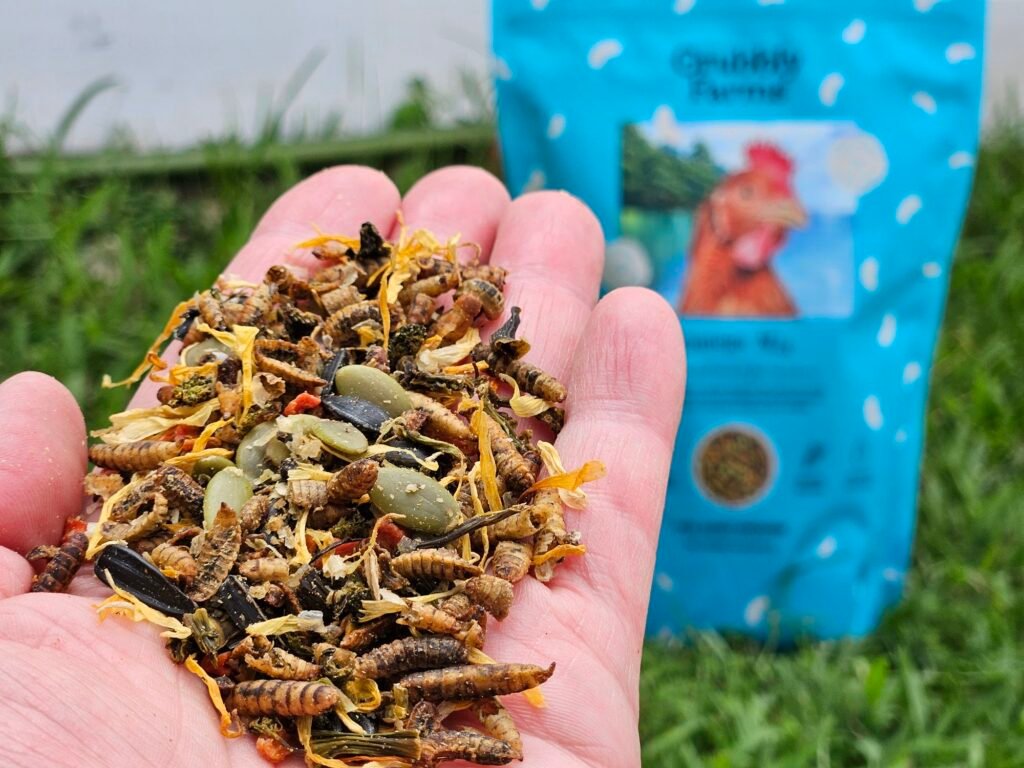
Vet Tip: If you’re unsure which supplement to start with, focus on niacin for ducklings and calcium for layers. These two cover the most critical needs for most pet duck owners.
Supplements for Ducklings
Ducklings are incredibly cute—but also incredibly nutritionally sensitive. Their bodies grow at an astonishing pace in the first few weeks, and that rapid growth means even small deficiencies can have big consequences.
While a high-quality waterfowl starter feed should always be your foundation, it doesn’t guarantee perfect nutrition, especially if you’re using chick starter or your ducklings aren’t eating well in the first few days. That’s where the right supplements come in.
Let’s take a closer look at what ducklings need and how to support them safely.
Why Ducklings Are More Vulnerable
- Fast growth = higher demands for protein, B vitamins (especially niacin), and minerals like phosphorus and magnesium.
- No nutritional reserves: They don’t store vitamins and minerals well, so they rely entirely on their diet.
- Unbalanced starter feeds: Many chick starters are too low in niacin and too high in calcium, which can lead to leg deformities or kidney stress.
- Stress from hatching, transport, or brooder changes can further deplete energy and hydration.
Even with the best intentions, it’s easy to miss something during this crucial window.
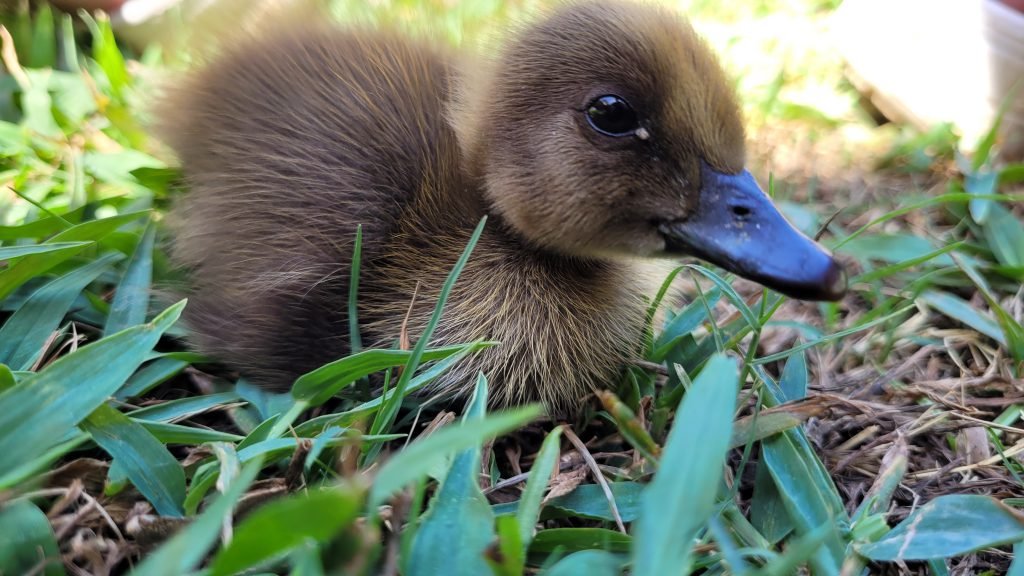
Core Duckling Supplement Needs
1. Niacin (Vitamin B3)
As mentioned earlier, this is non-negotiable for ducklings. Deficiencies can develop fast and cause bowed legs, splayed stance, or inability to walk.
Who is at risk?
All ducklings need niacin, but Jumbo Pekins (bred for extremely fast growth) and crested ducklings (which may have skull irregularities due to the crest gene) are especially vulnerable. Deficiency is most likely during the first 8 weeks, but even adult ducks may benefit from extra niacin during times of stress.
Why it matters:
Niacin is crucial for healthy muscle, nerve, and skeletal development. Because ducks don’t store it well in their bodies and often outgrow the supply found in chick starter feed, supplementation is key. Deficiencies can quickly lead to mobility issues or permanent leg deformities.
Special note for crested breeds: The crest forms due to a skull mutation that can sometimes leave a small gap in the skull or neurological vulnerabilities. Adequate niacin and B-vitamin support may help reduce the risk of related balance or coordination issues.
Symptoms to watch for:
- Wobbly gait or unstable walking
- Splayed or bowed legs
- Reluctance to stand or walk
- Swollen joints (especially hocks)
- Sitting constantly or “scooting” to move
How to help:
- Liquid B-complex is ideal for ducklings; it is easy to dose and very effective.
- Brewer’s yeast can be added to feed as a long-term maintenance option.
- Powdered Niacin can be added to their feed or drinking water.
- Typical duckling dose: 100–150 mg of niacin per gallon of drinking water (check your product label for specifics).
Understanding Liquid B-Complex vs. Powdered Niacin
Liquid B-Complex
Liquid B-complex supplements are multi-vitamin solutions that typically contain:
- Niacin (Vitamin B3)
- Thiamine (B1)
- Riboflavin (B2)
- Vitamin B6
- Vitamin B12
- And sometimes folic acid, pantothenic acid, and others
They are usually formulated for livestock or poultry, and are ready to be added directly to drinking water or given orally with a dropper.
Benefits:
- Easy to dose
- Covers multiple B vitamins, not just niacin
- Often used when ducklings are showing early signs of leg issues or neurological symptoms
- Highly absorbable
Example products:
- 🔗 Rooster Booster B-12 Plus
- Horse or goat B-complex supplements (some are poultry-safe, but always check the label)
Powdered Niacin (Plain Vitamin B3)
This is just niacin alone, usually in its plain crystalline (nicotinic acid) form—not time-release or flush-free, both of which should be avoided for birds.
You can dissolve it in their water for precise dosing, just like a liquid B-complex—but it doesn’t provide the full range of B vitamins.
Benefits:
- Ideal if you’re focused solely on niacin
- Easy to adjust dose for ducklings or large flocks
- Affordable and shelf-stable
Important Note:
No, powdered niacin is not the same as liquid B-complex. They both deliver niacin in liquid form when dissolved in water, but liquid B-complex provides a broader spectrum of B vitamins, which may be especially beneficial for:
- Crested ducklings with neurological concerns
- Ducklings recovering from shipping stress or illness
- Support during integration or sudden changes in diet/environment
From our brooder: We like using powdered niacin (plain vitamin B3) dissolved directly into our ducklings’ drinking water. It gives us precise control over the dose and is easy to refresh daily. If you’re looking for broader B-vitamin support, especially for crested ducklings or those with coordination issues, a liquid B-complex might be the better choice. For added support, we offered a small dish with vitamin water during the first week so they could self-regulate their intake.
Even if your starter feed says it contains niacin, many experts (including duck vets) recommend supplementing just to be safe.
Want to dive deeper? We explain all this in detail (with product options and dose tips) in our article on Niacin for Ducklings: Why It Matters and How to Supplement.
2. Electrolytes and Probiotics
Right after hatching or transport, ducklings benefit from gentle support for hydration and gut health. This combo helps reduce stress, encourages drinking, and promotes beneficial gut bacteria.
- Use during the first 2–3 days, or after any stressful event
- 🔗 Save-a-Chick Electrolytes
- 🔗 Hydro-Hen
- 🔗 Vitametz
Science tip: Probiotics help prevent harmful bacteria from colonizing the digestive tract, which is especially important in the first few days of life.

3. Multivitamins (Optional)
If you’re using a well-balanced starter feed and your ducklings are active and eating, extra vitamins are usually not needed. However, they can be useful:
- During or after illness
- After antibiotic use
- For ducklings with poor appetite or failure to thrive
- 🔗 Nutri-Drench for Poultry – great for quick recovery
- 🔗 Vitametz or Rooster Booster – for broader coverage
Our tip: In addition to their main water source, we offered ducklings a small separate bowl with vitamins during the first week. That way, they had free access, and we could monitor intake while ensuring they got a good nutritional foundation.
4. What NOT to Use
- ❌ Calcium supplements – Ducklings don’t need high calcium, and excess can damage their kidneys.
- ❌ Mixed adult vitamin products – Some are dosed for chickens or adult ducks, not tiny growing ducklings.
- ❌ Too many supplements at once – More isn’t better. Stick to 1–2 at a time unless directed by a vet.
From Our Experience
We’ve tried several approaches over the years, but here’s what’s worked best for us:
- Niacin dissolved in drinking water during the first few weeks made dosing easy and effective.
- A small bowl of vitamin water was available in the brooder alongside plain water for the first week.
- We used electrolytes + probiotics for the first 48–72 hours, especially for weak ducklings or those coming from uncertain circumstances (like Muffin, who was found less than a day old).
This routine has helped us raise strong, healthy ducklings with no leg problems or early developmental issues. Even when they come from uncertain circumstances, like Muffin, who was abandoned and only hours old when we found her.
Quick Reference Table
| Age | Key Needs | Suggested Supplements | Notes |
|---|---|---|---|
| 0–3 days | Hydration, gut support | Save-a-Chick, Hydro-Hen, Probiotic powder | Especially important if shipped or hand-hatched |
| 3–14 days | Bone & joint development | Brewer’s yeast, Liquid B-complex, Niacin, Electrolytes | Watch closely for any leg weakness or wobbling |
| 2–8 weeks | Steady growth & feathering | Continue niacin, introduce occasional multivitamins | Use Nutri-Drench or Poultry Cell for slow growers |
When Not to Supplement
While supplements can be incredibly helpful, it’s just as important to understand when not to use them. Over-supplementation is a common mistake, and in some cases, it can do more harm than good.
Fat-Soluble Vitamins Can Build Up
Vitamins A, D, E, and K are stored in the body rather than flushed out daily like B vitamins. Giving these in excess, especially through overlapping products, can lead to toxicity over time. Symptoms may include weakness, poor appetite, abnormal egg production, or even organ damage.
Too Much of a Good Thing
- Calcium overload in ducklings and drakes can cause kidney issues and soft tissue calcification.
- Excess niacin can lead to diarrhea, especially if combined with high-fat treats.
- Selenium toxicity can occur if you give multiple products containing it without realizing the overlap.
General Guidelines:
- Don’t “stack” multiple products unless you’ve calculated the total nutrient amounts.
- Don’t supplement vitamins daily unless there is a diagnosed deficiency or specific need.
- Never use time-release or flush-free human niacin—it’s dangerous for ducks.
- Observe your ducks: lethargy, diarrhea, or loss of appetite after adding a supplement may mean it’s not agreeing with them.
Rule of thumb: Use supplements to correct a gap, not just “because it’s healthy.” If your flock is thriving on balanced feed, you may not need to supplement at all.
How to Give Supplements: Practical Tips
Even the best supplements won’t help if your ducks won’t take them, or if they’re not given in a way that ensures absorption.
In Water
- Best for niacin, electrolytes, and multivitamin powders.
- Change water daily to keep it fresh and avoid bacterial growth.
- Avoid adding more than one product to water at a time unless you’ve verified compatibility.
In Feed
- Brewer’s yeast, flaxseed, and probiotic powders are easy to mix into crumbles or pellets.
- To make powder stick, slightly moisten the feed first or mix with treats like scrambled egg or chopped cucumber.
Oral Dosing
- For ducks who are sick, recovering, or need fast intervention, oral drenching (dropper to the beak) works well.
- Only use vet-approved products in this way and ensure the duck is calm and secure.
For Picky Ducks
- Try hiding powders inside fruits (strawberries, blueberries, watermelon), or soaked mealworms.
- Mix with their favorite veggies, like lettuce, cucumber, or peas, for a boost of interest.
Our Tip: For ducklings, we offer plain water + a second small dish with vitamin water during their first week. That way, they can choose, and we avoid accidental dehydration.
Recommended Products: Our Favorites
Here’s a snapshot of tried-and-true supplements we’ve used or would recommend based on our own duck-raising experience:
| Supplement Type | Product Example | Best For | How to Use |
|---|---|---|---|
| Niacin | 🔗 Powdered Niacin, 🔗 Liquid B-Complex | Ducklings (0–8 wks) | Daily in water |
| Electrolyte + Probiotic | 🔗 Vitametz🔗 Hydro-Hen | All ducks (short-term) | 1–3 days in water |
| Calcium + D3 | 🔗 Crushed Oyster Shell, 🔗 Calcium + D3 Powder (Avian Calcium) | Laying hens | Free-choice / sprinkled on feed |
| Multivitamin | 🔗 Nutri-Drench, 🔗 Vitametz, 🔗 Poultry Cell | Molting, illness, ducklings | As needed, short term |
| Omega-3 & Fatty Acids | 🔗 Grubblies, 🔗 Omega Mix | All ducks | 2–3x/week as treat or topper |
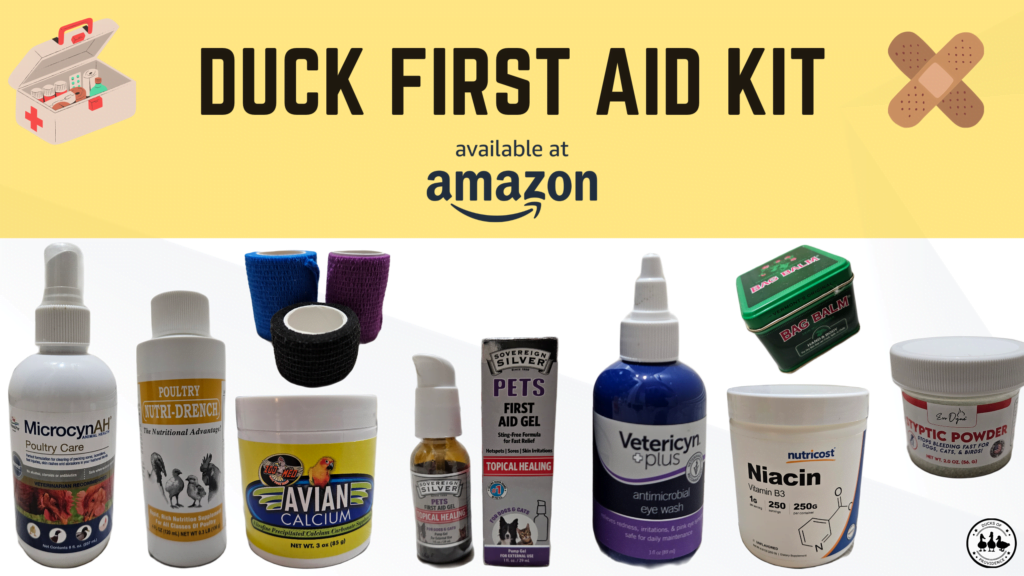
From Our Flock: What We’ve Used and Loved
We’ve raised ducklings from just hours old and supported our adult ducks through illness, reproductive issues, and high summer heat. Supplements have been part of our journey, not every day, but at the right time, they made all the difference.
- With Muffin, who came to us less than a day old, we gave niacin and probiotics in her water from day one. She was strong and alert from the start, and we truly believe the added support helped.
- Krümel, during her health scare, received Nutri-Drench and avian calcium during her recovery. Her energy picked up noticeably after just two days.
- Simon is our pickiest eater, so we mixed Nutri-Drench into peas and sweet corn together with a few Grubblies to get him to take his vitamins.
Every duck is different—what works for one may not work for another. The key is knowing your flock and watching how they respond.
FAQ: Duck Supplement Questions Answered
Can I use human vitamins for ducks?
Only if they are plain, water-soluble forms. Avoid flush-free or time-release niacin. When in doubt, stick to poultry-specific products.
Is brewer’s yeast the same as nutritional yeast?
Not quite. Both are rich in B vitamins, but brewer’s yeast has higher niacin content and is preferred for ducklings.
How long should ducklings be given niacin?
Daily until about 8 weeks of age. Some breeds (like Jumbo Pekins) may need longer support.
Should I mix multiple supplements in water?
It’s best to stick to one at a time. Combining products may dilute effectiveness or cause imbalances.
Can I give omega-3s through treats instead of supplements?
Absolutely! Grubblies, flaxseed, and chia are all duck-safe ways to add omega-3s naturally.
Do ducks need daily vitamins?
Not usually. A complete feed should cover daily needs—supplements are best used as needed.
Final Thoughts
Supplements can be powerful tools, but only when used thoughtfully. With the right timing and dosing, they can support your ducks through growth, recovery, laying, and seasonal stress. But the foundation of duck health will always be a balanced, high-quality feed and good husbandry.
Whether you’re raising your first ducklings or caring for a beloved house duck, keep learning, stay observant, and trust what your flock shows you. The extra effort you put into their care is more than repaid in tail wags, soft cuddles, and the joyful chaos only ducks can bring.
Related Articles
Want to learn more? We have separate, in-depth guides on:
- Essential Nutritional Needs of Ducks: A Complete Overview
- The Benefits Of Omega-3 and Omega-6 for Ducks
- Commercial Duck Feed Comparison
- The Importance of Niacin for Ducks: What Every Duck Keeper Should Know
- Soft-Shelled Eggs in Ducks – Everything You Need to Know


